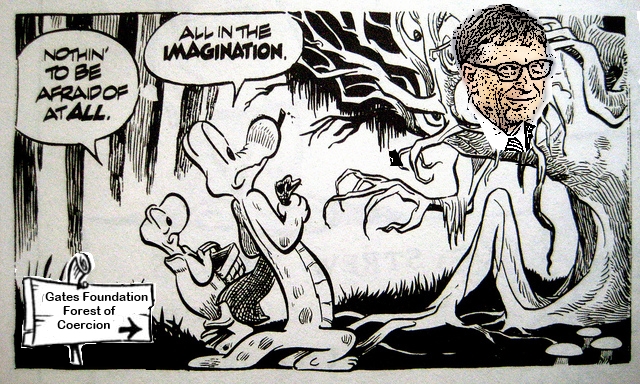”Subject opinion to coercion: whom will you make your inquisitors? Fallible men; men governed by bad passions, by private as well as public reasons. And why subject it to coercion? To produce uniformity. But is uniformity of opinion desirable? No more than of face and stature.” Thomas Jefferson, Notes on Virginia, 1782
When Jefferson wrote those words, he was emphasizing the need a democratic society has for tolerance of minority viewpoints. Today, even majority viewpoints may be subjected to coercion—by those whose pocketbooks enable them to purchase tremendous political power and who use that power to undermine democratic process in the public realm. The Gates Foundation subverts democracy by determining the “correct” path for public education, funding secret meetings and promoting private decisions—and misrepresenting those decisions as legitimate public policy. These actions fly in the face of American tradition and violate any sense of legitimacy.
Today, we hear people talk about the “Founding Fathers” as if they were some monolithic bloc of unanimous assent to the policies enacted by our national government. In reality, they were a bag of cats, arguing, conniving (and drinking) to create a constitution that might satisfy the needs of a diverse population. At least three delegates did not sign the final document. The Founding Fathers did, in fact, work secretly—a choice made to alleviate public outcry that might prevent full and uninhibited exploration of possible answers to the young nation’s problems. But while the meetings were held in secret, the attendees at the Constitutional Convention were legitimate representatives, granted authority by their respective states to make decisions on their behalf. The final document was then open to public debate and ratification—a heated contest, to be sure, and one that took nearly a year to complete. The Founding Fathers, lacking the hubris of corporate oligarchs, anticipated that changes to the Constitution might be desired, and provided a clear means to do so.
It was a model of democratic decision-making.
How well does the creation story of the Common Core State Standards measure up to that model? Not very.
The committee members for the CCSS were chosen by the National Governor’s Association (NGA) and the Council of Chief State School Officers (CCSSO). None of the NGA Educational Division staff had K-12 experience. You might expect that the members of the CCSS Math and English Language Arts Work Groups would have had extensive classroom teaching experience, but you’d be disappointed. Out of the 24 members, less than half had any classroom experience at all, and several of those were experienced in a content area other than that of their committee work. 14 members had direct ties to testing companies. That tells me that people were not primarily selected for professional qualifications, but that ties to the less-than-edifying testing industry counted at least as much. It also suggests to me that the purpose of the group was not to compose a document primarily for student benefit, but was instead to build a system that would be mined for profit. The fox was building the henhouse and designing the security system, so to speak. No wonder NGA and the CCSSO resisted releasing the names of committee members— obvious conflicts of interest between the common good and commercial interests were the rule.
These conflicts of interest alone ought to have caused queries of corruption; add to them the secrecy concerning membership and the process by which the committee worked and there is no reason left to grant legitimacy. Anyone believing that the CCSS is a document that has earned the right to be enforceable public policy has little understanding of democratic process.
Beyond all of this is the omission from the document of any method for ratification or amendment. CCSS was a fait d’accompli on arrival, since state officials were asked to commit themselves before the working committees ever met. In fact, the CCSS is not exactly a “public document” in any real sense, since ownership remains in the hands of the NGA and the CCSSO. This group got Arne Duncan and the federal Department of Education to act as their enforcers, making adherence to the CCSS part of the requirements states must meet for taking federal dollars. No state or individual has any legal power to demand reconsideration of the CCSS in whole or part, and probably never will.
At the rotten core of this perversion of democratic process is the Gates Foundation. Over $170 million dollars has been provided by Bill Gates to fund the creation and implementation of CCSS. These donations are not benevolent grants provided without strings to further a common good. They are at first bribes offered to public officials who, starved for ongoing revenue sources for any educational initiative, jumped on board without due diligence. They are at last the basis for coercion of the states, which must adhere to requirements for testing by companies that created the tests corresponding to the CCSS… and the (at least) equal coercion of teachers, for states must use those test results as a means for evaluating educators.
The power of law has been granted to CCSS without the necessary process to assure public input and debate. Coercion, rather than professional debate, has taken precedence as the source of educational policy.
That coercion is geared to turn math and English language arts classrooms into production venues of standardized, homogenized instruction. “All children can learn” becomes “All children will learn what, how, and when we want them to, and for as long as we make money from it…”
Thomas Jefferson warned against people like Bill Gates over 230 years ago. Bill Gates is that fallible man who is governed by a bad passion for privatized, monetized, and standardized education. He seeks uniformity because it provides a sense of certainty in a field which ought to reject anything of the sort. Corporations can’t adequately predict needs and outcomes if educators creatively expand horizons of learning as they work alongside students. As Gates said, back when the CCSS committees were just getting started, “When the tests are aligned to the common standards, the curriculum will line up as well—and that will unleash powerful market forces in the service of better teaching. For the first time, there will be a large base of customers eager to buy products that can help every kid learn and every teacher get better.”
Mr. Gates, the common good is not compatible with coercion. When your “donations” are offered to grateful educators so that they can do meaningful professional work in a democratic setting, you’ll be welcome to join in at the appropriate moment for public input. You are not welcome to pre-determine the topics for discussion, nor the outcomes of those discussions. You are not welcome to disregard the voices of professionals or to fund the coercion of educators.
We intend to close the door on Mr. Gates.
Join the Washington State BATs on June 26, 2014, at the door of the Gates Foundation, Seattle, WA!
© David Sudmeier, 2014


I wish you the best of luck. You should show up at the NEA RA in Denver to get a larger audience. I believe your task is going to be almost impossible because the potential financial gains by the wealthy individuals on the other side will never stop unless they see no way to make lots of money. They were able to get the Supreme Court to declare a corporation is an individual, so they believe their wealth can buy anything including the US Senate and House of Rep. and other high offices. Party affiliation no longer matters because they can still buy your vote! I believe the only answer is a national boycott by ALL public school teachers! Your event will probably not get any media coverage because they own the media, also. And people believe another Hitler could never happen again! Did the Senate or House give Arne Duncan authority to coerce the states into adopting CCSS and the testing and using Federal money to accomplish this Federal takeover of the curriculum? We will be watching and hoping!
Thank you for trying.
LikeLike
Thanks for the good wishes!
I’m perhaps a bit more hopeful than you that grass roots activism can achieve long-term goals. I think that the NEA (and AFT) have not yet stepped up to the task of combatting corporatism in education, but that pressure is slowly building toward that due to member outcry.
I also hope that you–well, all of us–will not throw up our arms in despair and defeat. This is not a new battle. It has a long history, and requires a long view. I think a national strike is far in the future, and that the necessity for such action can be alleviated if we can educate the public about the current distortion of democracy and education by guys like the Kochs and Gates.
Hey, we’re educators–we’re pros at this!
Thanks again for taking time to share your observations.
Dave
LikeLike
Very nice post. I just stumbled upon your blog and wanted to say that
I have truly enjoyed surfing around your blog posts. In any case I will be subscribing to
your rss feed and I hope you write again very soon!
LikeLike
Thanks–and welcome to my blog! A wrist injury has interrupted my posts, but I’ll be up and running soon!
LikeLike